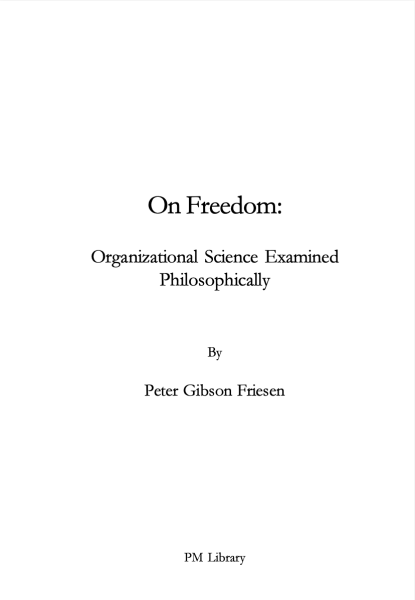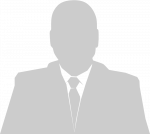On Freedom
Organizational Science Examined Philosophically

Obtain this book
On Freedom: Organizational Science Examined Philosophically
A Critical Review
Introduction
Peter Gibson Friesen's "On Freedom: Organizational Science Examined Philosophically" represents an ambitious interdisciplinary exploration that bridges organizational science, developmental psychology, logic, moral philosophy, and political theory. Friesen, whose background spans philosophy, law, and organizational science, draws upon his collaboration with Elliott Jaques, the founder of Requisite Organization theory, to examine the contours of human freedom across multiple domains. The book, structured as five interconnected essays, presents freedom not as the absence of constraints but as the affirmation of value that transforms boundaries.
At its core, this work examines how organizational structures reflect patterns of human cognitive development and how understanding these patterns illuminates the nature of freedom in its scientific, intellectual, moral, political, and spiritual dimensions. For executives and organizational consultants, Friesen's work offers a philosophical foundation for understanding why certain organizational structures succeed while others fail, grounding organizational design in human cognitive development.
Main Themes and Arguments
Scientific Freedom
Friesen begins by challenging conventional notions of scientific freedom. Rather than viewing science as merely the removal of political or religious interference, he positions scientific freedom as a state of confidence combined with caution that enables theoretical revision and investigation. This freedom represents "the mental discernment of a reality beneath appearances," characterized by an openness to revise one's understanding when confronted with new evidence.
The author traces how science emerged historically not merely through intellectual development but through a shift in human self-awareness. He argues that the scientific revolution was enabled by a spiritual orientation valuing the comprehensibility of the universe—a belief that there is a reality "out there" that humans can know. Science thus began with confidence or faith in this proposition, strong enough to countervail against religiously sanctified constructs.
Friesen challenges the notion that science must be ethically neutral, arguing instead that science itself emerged from an ethical affirmation—the value placed on knowing truth. He examines how both ancient thinkers like Plato and Enlightenment philosophers like Kant attempted to reconcile empiricism and idealism by recognizing that the world as we construct it is reactive to both interior and exterior influences.
A significant portion of this section explores Elliott Jaques' discoveries regarding organizational hierarchy. Jaques found that time-span thresholds marking divisions between managerial tiers were remarkably consistent across diverse organizations. These thresholds (at one day, three months, one year, two years, five years, ten years, etc.) represented qualitative shifts in information processing capabilities. This consistency suggests that social stratification mirrors the natural progress of human intelligence, revealing an ethical universe embedded in developmental constants.
Intellectual Freedom
The second essay examines how the intellect processes information and develops over time. Friesen argues that intellect cannot exist without interest—a motivating force that activates investigation. He presents a "logic of work" or "developmental logic" that explains intellectual development through a series of information processing modes.
Friesen introduces a notational system (adapted from G. Spencer Brown's "Laws of Form") to explain how objects form through the intervention of value. Beginning with a capacity of 1, representing a baseline mental capability, he traces how intelligence evolves through distinct information processing modalities:
- Declarative processing (capacity 1): Focused on singular constructs, limited to processing one thing at a time
- Cumulative processing (capacity 2): Adding the ability to retain and aggregate information
- Serial processing (capacity 3): Adding the ability to infer relationships and implications
- Parallel processing (capacity 4): Adding the ability to organize multiple series into unified patterns or theories
Each stage represents not merely more knowledge but a qualitatively different way of processing information. What was once effortful becomes automatic, freeing capacity for new challenges. The progression repeats at higher orders of complexity, with a fifth level (new declarative phase) representing both completion of one cycle and commencement of another.
Importantly, Friesen argues that this developmental sequence explains not just individual cognitive development but also the stratification observed in complex organizations. Bureaucratic hierarchies reflect these natural cognitive thresholds. The insight that the same information processing limitations apply across scales provides a framework for understanding organizational design that respects human cognitive capabilities.
Moral Freedom
The third essay shifts focus from how intellect processes information to how humans form moral identities within social contexts. Moral freedom emerges as one develops a socially viable identity that embraces collective norms while maintaining autonomy.
Friesen argues that moral development follows a progression similar to intellectual development, but focused on identity rather than objects. He connects this progression to narrative forms, drawing on Northrop Frye's classification of literary genres:
- Comedy corresponds to declarative processing and concerns existence—the basic claim to social membership and the assertion "you shall not kill"
- Romance corresponds to cumulative processing and concerns property—the protection of social entitlements and "you shall not steal"
- Tragedy corresponds to serial processing and concerns trust—the acceptance of social bonds and "you shall not commit adultery"
- Irony corresponds to parallel processing and concerns honesty—the recognition of universal dignity and "you shall not bear false witness"
The fifth stage, returning to comedy but at a higher order, concerns autonomy and "you shall not covet"—a morality of self-actualization and contentment with one's identity.
This framework explains moral development as neither purely cognitive nor purely emotional, but as a process whereby one forms a social identity through mythic narratives. Moral freedom represents the successful integration of personal needs with social values, creating an autonomous self capable of mature social engagement.
Political Freedom
The fourth essay examines how diverse moral systems coexist within political structures. Friesen argues that political freedom emerges when societies develop mechanisms to accommodate diverse moral perspectives without requiring uniformity.
The author introduces a model of language as a three-tiered system:
- Semantic level: Concerned with meaning and reference to external reality
- Syntactic level: Concerned with organization and structure
- Presentive level: Concerned with identity and receptivity to "deity" (conscience)
This model parallels the structure of law:
- Substantive law: Defining obligations
- Procedural law: Resolving conflicts
- Constitutive law: Establishing authority
Political freedom requires mechanisms that enable dialogue between government and citizens, including:
- The vote: Creating active-active exchange between sovereign and subject
- The rule of law: Providing coherent application of rules
- Constitutional rights: Protecting individual sovereignty
Friesen argues that a politically free society must include a "presentive event" where conscience can intervene in legal discourse. This allows for moral diversity while maintaining social cohesion. Political freedom thus represents an elevated ethical consciousness that can accommodate diverse moral viewpoints while maintaining social order.
Spiritual Freedom
The final essay explores spiritual freedom as the liberation of consciousness from material constraints. Rather than treating spirit as an exception to matter, Friesen presents a "liberative theology" where spirit is primary and matter is a temporary limitation.
Spiritual freedom emerges as one recognizes that boundaries occur within value, not around it. This perspective allows for progress through:
- Breaking down the opposition between self and other
- Resolving conflicts through non-violent means
- Extending compassion even to enemies
The author argues that spiritual progress is demonstrated in historical achievements like the development of democratic institutions and industrial economies. These innovations required trust that human nature is fundamentally cooperative rather than competitive, representing spiritual breakthroughs.
Friesen concludes that freedom in all its forms—scientific, intellectual, moral, political, and spiritual—represents affirmation rather than negation. Freedom is not primarily about removing constraints but about recognizing and affirming value that transcends boundaries.
Key Insights for Executives and Organization Design Consultants
1. Organizational Hierarchy as Cognitive Reality
Friesen's work provides a philosophical foundation for Jaques' discoveries about organizational hierarchy. The consistency of time-span thresholds across diverse organizations reflects natural cognitive limitations rather than arbitrary power structures. When organizations are designed with these thresholds in mind—a "requisite organization"—individuals function more comfortably and effectively.
For executives, this insight suggests that organizational problems often stem from misalignment between role complexity and cognitive capability. When employees are placed in roles that match their information processing capacity, both the individuals and the organization prosper.
2. Development as Integration of Information Processing Skills
The developmental logic presented offers a framework for understanding how individuals and organizations evolve. Growth occurs as new information processing skills are integrated and become automatic, freeing capacity for new challenges.
For consultants, this model provides a diagnostic tool for identifying developmental bottlenecks in both individuals and systems. It suggests targeted interventions aimed at integrating specific processing skills rather than general capability building.
3. Moral Development and Organizational Culture
Friesen's framework connecting moral development to narrative forms offers insights into organizational culture. Different organizations or departments may operate predominantly within different moral frames (existence, property, trust, honesty, autonomy).
Executives should recognize that conflicts often arise not from bad intentions but from different moral orientations. Creating a mature organizational culture requires accommodating diverse moral perspectives while maintaining shared values.
4. Balancing Structure and Freedom in Governance
The political freedom essay offers a sophisticated model for organizational governance. Effective governance requires:
- Mechanisms for dialogue across hierarchical levels
- Consistent application of policies and procedures
- Protection of individual autonomy within collective structures
Organizations that balance these elements create environments where both structure and freedom coexist, fostering both productivity and innovation.
5. Spiritual Dimension of Leadership
Friesen's discussion of spiritual freedom challenges executives to consider the deeper purposes of organizational life. Beyond profit or efficiency, organizations can be vehicles for human development and social progress.
Leaders operating from spiritual freedom recognize that conflicts often stem from limiting perspectives rather than irreconcilable interests. This insight enables them to find creative solutions to seemingly intractable problems.
Critique and Limitations
Despite its depth and originality, "On Freedom" presents several challenges:
- Accessibility: Friesen's prose is dense and often technical, employing specialized notational systems that may be difficult for readers without philosophical training. The author acknowledges this difficulty in the preface.
- Evidence Base: While drawing on Jaques' empirical work, the book sometimes moves beyond established evidence into speculative territory, particularly in the spiritual freedom section.
- Cultural Breadth: The framework is primarily grounded in Western philosophical traditions and may not fully account for other cultural perspectives on freedom and development.
- Practical Application: Although rich in theoretical insights, the book offers limited concrete guidance for implementing these ideas in organizational settings.
Conclusion
"On Freedom: Organizational Science Examined Philosophically" offers a profound philosophical foundation for organizational theory. By connecting organizational structure to human cognitive and moral development, Friesen provides a framework that explains why certain organizational forms succeed while others fail.
For executives and organizational consultants, the book's greatest value lies in its unified vision of human development. It suggests that effective organizations must be designed with an understanding of how humans process information, form identities, and create meaning. When organizational structures align with these developmental realities, they become not just efficient but liberating—enabling human freedom rather than constraining it.
Friesen's work challenges us to see freedom not as the absence of structure but as the affirmation of value. This perspective transforms how we think about organizational design, suggesting that the best structures are those that enable human development across scientific, intellectual, moral, political, and spiritual dimensions.
While demanding significant intellectual investment from readers, "On Freedom" rewards that investment with a comprehensive framework that illuminates the deep connections between human development and organizational life. For those willing to engage with its challenging ideas, it offers a vision of organization as a vehicle for human freedom rather than a constraint upon it.





